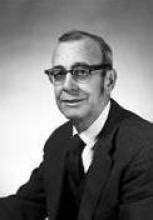A Quote by Friedrich August von Hayek
The greatest danger to liberty today comes from the men who are most needed and most powerful in modern government, namely, the efficient expert administrators exclusively concerned with what they regard as the public good.
Related Quotes
Experience should teach us to be most on our guard to protect liberty when the Government's purposes are beneficent. Men born to freedom are naturally alert to repel invasion of their liberty by evil-minded rulers. The greatest dangers to liberty lurk in the insidious encroachment by men of zeal, well meaning but without understanding.
The danger is that we may fail to perceive life's greatest meaning, fall short of its highest good, miss its deepest and most abiding happiness, be unable to render the most needed service, be unconscious of life ablaze with the light of the Presence of God - and be content to have it so - that is the danger. That some day we may wake up and find that always we have been busy with the husks and trappings of life - and have really missed life itself.
Safety from external danger is the most powerful director of national conduct. Even the ardent love of liberty will, after a time, give way to its dictates. The violent destruction of life and property incident to war, the continual effort and alarm attendant on a state of continual danger, will compel nations the most attached to liberty to resort for repose and security to institutions which have a tendency to destroy their civil and political rights. To be more safe, they at length become willing to run the risk of being less free.
Is the relinquishment of the trial by jury and the liberty of the press necessary for your liberty? Will the abandonment of your most sacred rights tend to the security of your liberty? Liberty, the greatest of all earlthy blessings - give us that precious jewel, and you may take every things else! . . . Guard with jealous attention the public liberty. Suspect every one who approaches that jewel.
As a reformer the liberal is dissatisfied with things as they are because they violate his exceptionally tender conscience.... Liberalism does not advocate change for its own sake, but for the sake of something better in the direction of what he regards as good, namely, the maximum of liberty consistent with a regard for all men and all interests -- the general happiness based on peace and justice.
Human beings act in a great variety of irrational ways, but all of them seem to be capable, if given a fair chance, of making a reasonable choice in the light of available evidence. Democratic institutions can be made to work only if all concerned do their best to impart knowledge and to encourage rationality. But today, in the world's most powerful democracy, the politicians and the propagandists prefer to make nonsense of democratic procedures by appealing almost exclusively to the ignorance and irrationality of the electors.




































